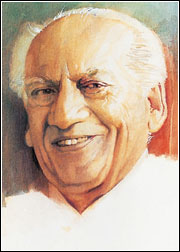great Poetry of The legend Faiz Ahmad Faiz here.By ahmedjanFaiz Ahmed Faiz (1911–1984) (Urdu: فیض احمد فیض) was a renowned Pakistani poet, and one of the most famous poets of the Urdu language. He was a member of the Anjuman Tarraqi Pasand Mussanafin-e-Hind (All India Progressive Writers' Movement) and an avowed Marxist. In 1962, he was awarded the Lenin Peace Prize by the Soviet Union.

Faiz Ahmed Faiz was born in Kala Kader village, Sialkot : سیالکوٹ in Punjab in British India to Sultan Mohammad Khan and his youngest wife Fatima.
Following the Muslim tradition in South Asia, at an early age Faiz was sent to the Masjid (Mosque) to be oriented to the basics of religious studies by Maulvi Muhammad Ibrahim Mir Sialkoti. He went on to the Scotch Mission School, Sialkot, for academic education and after matriculation joined Murray College, Sialkot, Punjab for intermediate study and graduation. His most influential teachers were Professor Yousuf Saleem Chishti, who taught Urdu, and Shams-ul-Ullamah Syed Mir Hasan, who taught Arabic. Hasan had also taught the renowned philosopher, poet, and politician of South Asia, Allama Dr. Muhammad Iqbal. Faiz acquired a post-graduate degree from the Government College, Lahore, a Master of Arts in English Literature, and he also attended the Oriental College in Lahore, where he obtained another master's degree in Arabic Literature.
Faiz started a branch of Progressive Writers' Movement in Punjab in 1936. Also he was a Member and Secretary of this branch. He was also an Editor of Mahnama (Monthly). Faiz became a lecturer in English at M. A. O. College, Amritsar in 1935 and then at Hailey College of Commerce, Lahore. He briefly joined the British Indian Army and was promoted to the rank of Lieut. Colonel in 1944. He resigned from the Army in 1947 and returned to Lahore to become the first editor-in-chief of the Pakistan Times. In 1959 he was appointed as Secretary, Pakistan Arts Council and worked in that capacity till 1962
Returning from London in 1964 he settled down in Karachi and was appointed as Principal at Abdullah Haroon College. Faiz distinguished himself as a journalist and was editor of the Pakistan Times, the Urdu newspaper 'Imroze' and the weekly Lail-o-Nihar. In the 1965 war between India & Pakistan he worked in an honorary capacity in the Department of Information and during that period Faiz was very much close to the senior officers, like Syed Fakhruddin Balley. In exile he acted as Editor of the magazine Lotus in Moscow, London and Beirut.
Faiz wrote poems that opposed the bloodshed during separation of Bangladesh from Pakistan
Faiz was an avowed supporter of Sufism. He had close relations with several Sufi saints of his time. He was a favourite of Baba Malang Sahib, a Sufi of Lahore, Wasif Ali Wasif, Ashfaq Ahmad, Syed Fakhruddin Balley and other renowned sufis. Once when he was asked how he could compare Sufis with socialist comrades, he replied, "They [Sufis] are the real comrades". He is also credited for coining the term Ana al-Haqq in the political sense.
Major worksNaqsh-e-Faryadi (1943)
Dast-e-Saba (1952)
Zindan-Nama (1956)
Dast-e-Tah-e-Sung (1965)
Mere Dil Mere Musafir
Sar-e-Wadi-e-Sina
All these have been combined as one book Nuskha Haaye Wafa (Urdu: نسخہ ہاے وفا
